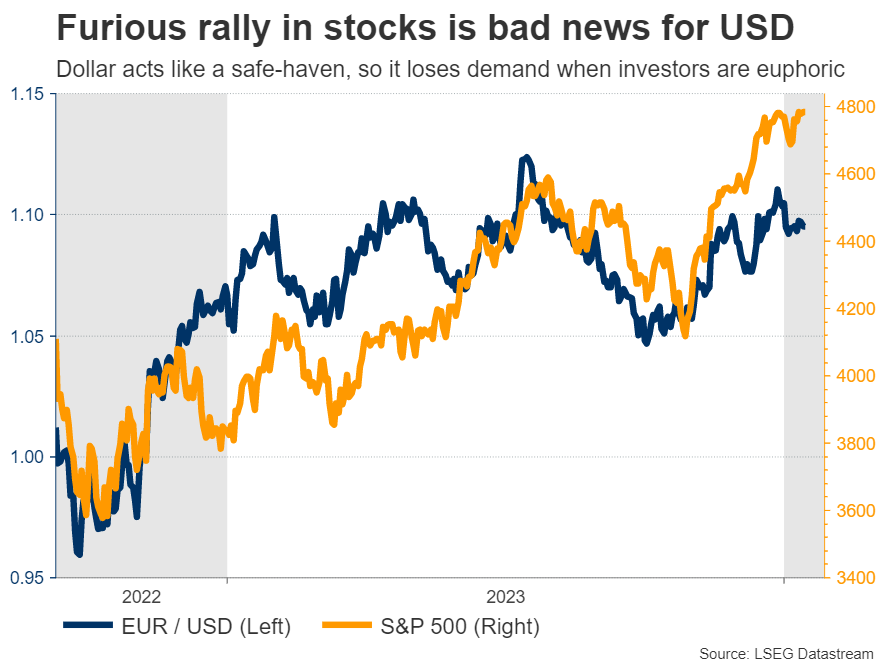- US retail sales expected to have risen again in December
- Strong dataset could dampen speculation of rapid Fed rate cuts
- Data due at 13:30 GMT Wednesday, crucial for dollar’s path
Waiting for Fed rate cuts
The US economy put in a stellar performance last year. Real economic growth remained around 3%, fueled by resilient consumer spending, a tight labor market, and an enormous government deficit.
Meanwhile, inflation has declined at a steady pace, with some help from falling energy prices. That’s great news for American consumers, who are finally seeing their wages rise faster than prices. In other words, real income growth has finally turned positive.
With inflation cooling, markets have become increasingly confident that the Federal Reserve will soon begin to cut interest rates. The implied probability for a rate cut in March currently stands at 80%, while for the entire year, investors expect more than six rate cuts in total.
As such, the upcoming data releases will be crucial as they will either validate this narrative or push against it, driving the US dollar accordingly. Strong economic data generally dampen speculation for rate cuts and boost the dollar. The opposite is true as well.
Did retail sales jump during the holidays?
The most important release of the week will come on Wednesday with the latest edition of retail sales, which are considered a proxy for consumption. Forecasts suggest that both headline and core retail sales rose in December, by 0.3% and 0.2% respectively, in monthly terms.
It therefore appears that the holiday shopping season was a successful one, something corroborated by monthly credit card spending data released by Mastercard (NYSE:MA) as well as the newly-released CNBC/NRF retail sales monitor, which attempts to track official retail sales.
This tracker pointed to a monthly retail sales increase of 0.44% in December, which is above the consensus forecast of 0.3% that economists have penciled in. As such, the risks seem tilted towards a positive surprise in this dataset, rather than a disappointment.
Coming on top of a hotter-than-expected inflation report last week, another upside surprise in retail sales could help dampen speculation about imminent Fed rate cuts and by extension, help the dollar regain some momentum.
Looking at the euro/dollar chart, the 1.0870 zone could provide initial support to any declines. On the flipside, a disappointment in this dataset could send the pair higher, perhaps towards the 1.1010 region.
What’s next for the USD?
In the FX market, the dollar has struggled in recent months as the market priced in heavier rate cuts by the Federal Reserve for this year. The huge rally in the stock market was another reason for the dollar’s underperformance, as the cheerful sentiment diminished demand for safe haven assets.
Now, the question is whether this trend will continue or reverse moving forward. In this sense, there is some scope for the dollar to stage a comeback in the coming months. The US economy is still in good shape, which makes the market pricing for more than six Fed rate cuts this year appear excessive.
If incoming data remains resilient, leading traders to unwind some of those rate-cut bets, the dollar could benefit. Similarly, the outlook for the euro area economy is rather dark, making it difficult for the euro to sustain any advances.
In this sense, the upside risks surrounding the dollar seem to outweigh the downside risks, although the evolution of global risk appetite in the markets and geopolitical events will also play a crucial role.




